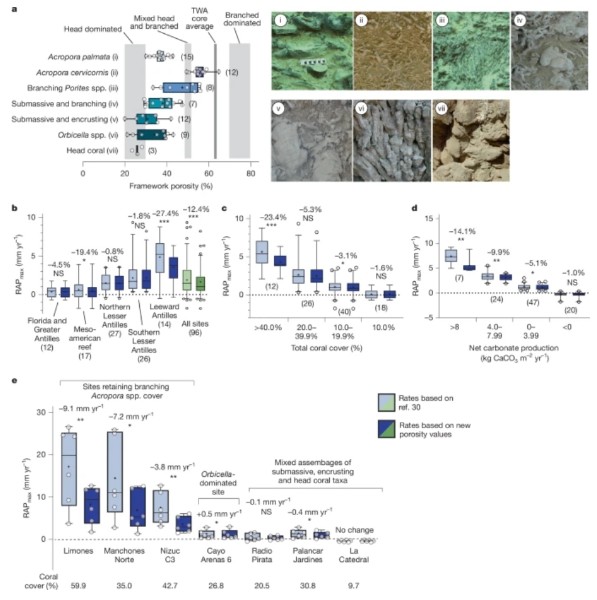
近日,英国埃克塞特大学Chris T. Perry团队的研究显示:变暖超过2°C,大西洋珊瑚礁生长减少会加剧对海平面的影响。相关论文于2025年9月17日发表在《自然》杂志上。
珊瑚礁形成复杂的物理结构,可以帮助减轻沿海洪水的风险。由于气候变化和局部人为压力,海平面上升和珊瑚礁生长受损,这一功能将被削弱。预计珊瑚礁表面以上的水深将因此增加,但这种增加的幅度和时间尺度没有得到很好的约束,这限制了沿海脆弱性的建模。
研究组分析了400多个热带西大西洋地点的化石珊瑚礁沉积物,以限制珊瑚礁生态与生长潜力之间的联系,并评估了在各种共享社会经济途径(SSP)排放情景下,到2100年珊瑚礁上水深增加的幅度。他们的分析预测,到2040年,超过70%的热带西大西洋珊瑚礁将转变为净侵蚀状态,但如果变暖超过2°C (SSP2-4.5或更高),到2100年,几乎所有的珊瑚礁(至少99%)都将受到侵蚀。
珊瑚礁生长与海平面上升的不同步变化将放大海平面上升的影响:在所有变暖情景下,预计到2060年水域深度将比当前增加约0.3-0.5米;但若变暖幅度超过2℃,到2100年预计水深将增加0.7-1.2米。这将加剧珊瑚礁护卫海岸带的洪水风险,并改变近岸水动力环境与生态系统。珊瑚礁修复虽能促进礁体生长,但即便结合积极的气候减缓措施,也仅能令2100年的海平面上升效应降低约0.3-0.4米。
附:英文原文
Title: Reduced Atlantic reef growth past 2 °C warming amplifies sea-level impacts
Author: Perry, Chris T., de Bakker, Didier M., Webb, Alice E., Comeau, Steeve, Harvey, Ben P., Cornwall, Christopher E., Alvarez-Filip, Lorenzo, Prez-Cervantes, Esmeralda, Morris, John, Enochs, Ian C., Toth, Lauren T., ODea, Aaron, Dillon, Erin M., Meesters, Erik H., Precht, William F.
Issue&Volume: 2025-09-17
Abstract: Coral reefs form complex physical structures that can help to mitigate coastal flooding risk1,2. This function will be reduced by sea-level rise (SLR) and impaired reef growth caused by climate change and local anthropogenic stressors3. Water depths above reef surfaces are projected to increase as a result, but the magnitudes and timescales of this increase are poorly constrained, which limits modelling of coastal vulnerability4,5. Here we analyse fossil reef deposits to constrain links between reef ecology and growth potential across more than 400 tropical western Atlantic sites, and assess the magnitudes of resultant above-reef increases in water depth through to 2100 under various shared socioeconomic pathway (SSP) emission scenarios. Our analysis predicts that more than 70% of tropical western Atlantic reefs will transition into net erosional states by 2040, but that if warming exceeds 2°C (SSP2–4.5 and higher), nearly all reefs (at least 99%) will be eroding by 2100. The divergent trajectories of reef growth and SLR will thus magnify the effects of SLR; increases in water depth of around 0.3–0.5m above the present are projected under all warming scenarios by 2060, but depth increases of 0.7–1.2m are predicted by 2100 under scenarios in which warming surpasses 2°C. This would increase the risk of flooding along vulnerable reef-fronted coasts and modify nearshore hydrodynamics and ecosystems. Reef restoration offers one pathway back to higher reef growth6,7, but would dampen the effects of SLR in 2100 only by around 0.3–0.4m, and only when combined with aggressive climate mitigation.
DOI: 10.1038/s41586-025-09439-4
Source: https://www.nature.com/articles/s41586-025-09439-4
Nature:《自然》,创刊于1869年。隶属于施普林格·自然出版集团,最新IF:69.504
官方网址:http://www.nature.com/
投稿链接:http://www.nature.com/authors/submit_manuscript.html
